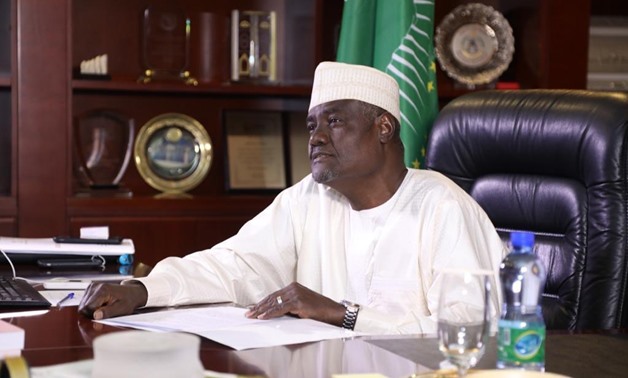
AU Commission chairperson Moussa Faki Mahamat- Photo courtesy of the South African President Cyril Ramaphosa's Twitter account.
CAIRO - 28 June 2020: Chairperson of the African Union Commission (AUC) Moussa Faki Mahamat stated on Saturday that more than 90 percent of the disputed issues regarding the controversial Grand Ethiopian Renaissance Dam (GERD) among Egypt, Sudan and Ethiopia have been resolved.
“The Bureau of the Assembly [the AU Extraordinary Bureau of the Assembly of Heads of States and Governments] received with appreciation a report from Chairperson of the AUC Moussa Faki Mahamat, which inter alia noted that more than 90 percent of the issues of the Tripartite Negotiations between Egypt, Ethiopia and Sudan have already been resolved,” the African Union announced in a communique issued Saturday on the virtual teleconference held by the Bureau of the Assembly members on the dam issue.
The AU said that the three countries displayed a constructive and positive approach in the negotiations, urging the three parties “to expeditiously work towards finding a mutually acceptable and amicable solution on the outstanding technical and legal issues in the negotiation process.”
“The Bureau of the Assembly welcomed the undertaking by the three parties to refrain from making any statements or taking any action that may jeopardize or complicate the AU-led process aimed at finding an acceptable solution on all outstanding matters,” the statement read.
The AU also announced that the newly-formed legal and technical committee, which includes the three parties and South African President Cyril Ramaphosa, the current president of the AU, members from the assembly and representatives from the commission, will submit its report on the disputed issues to President Ramaphosa within a week from the issuance of the communique.
According to the communique, the head of the three countries will meet again in two weeks from the issuance of this joint statement.
The AU statement was issued few hours after Ethiopia dodged by announcing that it would fill the dam’s reservoir in the coming two weeks, in conjunction with finalizing a binding deal, although the three parties agreed on abstaining from taking any unilateral measure, including filling the dam, before an agreement is reached.
“Ethiopia is scheduled to begin filling the GERD within the next two weeks, during which the remaining construction work will continue. It is in this period that the three countries [Egypt, Sudan, and Ethiopia] have agreed to reach a final agreement on few binding matters,” announced the Office of Ethiopian Prime Minister Abiy Ahmed in a statement.
In the AU meeting, President Abdel Fatah al-Sisi said that Egypt is ready to resume negotiations with Sudan and Ethiopia to reach a fair and balanced agreement on filling and operating GERD.
"To ensure successful negotiations, all parties shall pledge to not make any unilateral decisions, as well as halt the dam's filling until reaching an agreement preserving the three countries' interests," Sisi said.

President Sisi gives his speech at the meeting- photo courtesy the South African President's Twitter Account
"A letter with the AU meeting’s outcomes will be sent to the Security Council, as it is the international body with jurisdiction, in order to take it into consideration when holding a session to discuss the Renaissance Dam issue on Monday," announced Egyptian Presidential Spokesperson Bassam Radi in a statement.
Since 2014, Egypt, Ethiopia, and Sudan have entered into negotiations on the building of the dam to avoid any possible threats on the Nile downstream countries [Egypt and Sudan]. The latest round of the talks which convened early June reached a stalemate, ahead of the Ethiopian unilateral act of deciding to fill the dam’s reservoir mid-July without reaching a final agreement among the three countries.
Egypt previously decided to request the United Nations Security Council’s intervention in the dispute on Ethiopia’s massive dam, after Egypt had said several times that the two countries have reached a deadlock.
The conflict between Egypt, Sudan, and Ethiopia dates back to May 2011 when Ethiopia started building the dam; Egypt voiced concern over its water share [55.5 billion cubic meters]. Three years later, a series of tripartite talks between the two countries along with Sudan began to reach an agreement while Ethiopia continued the dam construction.
In 2015, the three countries signed the Declaration of Principles, per which the downstream countries should not be negatively affected by the construction of the dam. In October 2019, Egypt blamed Addis Ababa for hindering a final agreement concerning a technical problem, calling for activating Article No. 10 of the Declaration of Principles, which stipulates that if the three countries could not find a solution to these disputes, they have to ask for mediation.


Comments
Leave a Comment